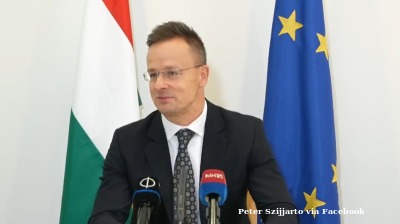IMF backsliding on Ukraine’s reform pressure, confirms it won't insist on land reform for next tranche

The backsliding amongst Ukraine’s international partners to cut the government some slack ahead of presidential elections continues, with the International Monetary Fund (IMF) confirming rumours that it will not insist land reforms are made before it releases its next aid tranche.
Changing the law to allow for the sale of land and so create a market was one of the three crucial reforms on the IMF’s docket for this year. The other two were pension reform and the creation of an independent anti-corruption court.
The Rada has already passed the pension reform law in the first reading and is due to complete the remaining two readings in the autumn session.
However, the EU drew wide spread criticism when President of the European Commission Jean-Claude Juncker told journalists on July 13 that the EU would be happy with an anti-corruption chamber of the Supreme Court rather than a totally independent court. Even the National Anti-Corruption Bureau of Ukraine (NABU), which would be the main client of the court, came out against the idea. No one is expecting much progress on the court to be made this year.
Likewise, during President Petro Poroshenko’s trip to Washington last month he seems to have pursued the IMF to relax its stance on the land reforms.
A draft new land code that allowed for only very small plots of land to be sold was roundly defeated at a vote earlier this year. On May 18, only 17 lawmakers supported the motion with a minimum of 226 votes needed, sending a clear message to the IMF that almost all political forces in Kyiv reject its demands to launch an agricultural land market.
Ukrainian Agrarian Minister Taras Kutovy announced his resignation almost immediately afterwards on May 23, which many took as an omission that the reform cannot be passed at the moment.
As Ukraine remains largely dependent on the IMF handouts, it seems the Fund has taken a political decision to support the current government by relaxing its demands. Presidential elections are due in 2019 and the government is already extremely unpopular. The land bill is one of the most emotive issues on the docket and forcing it through would cost Poroshenko and his eponymous blocks votes they can’t afford to lose.
The fifth loan tranche of the four-year Extended Fund Facility (EFF) loan programme is in doubt due to the slow progress with reform. IMF Deputy Spokesman William Murray confirmed at a July 20 press briefing: “Land reform remains an important condition under the program. However, given the need to design the reform well and reach consensus on key steps ahead, there was a need to reset its timing to later in the year.”
Murray’s comment was the first official confirmation of Ukrainian media reports – citing anonymous sources – stating that the IMF had decided to allow the postponement of the farmland market’s launch.
Instead, the focus of the next review will be on pension reform and measures to speed up privatisation and ensure concrete results in anti-corruption efforts, Murray said.
“In its April memorandum with the IMF, the Ukrainian government committed for the 2Q17 to hire an adviser to help PrivatBank collect impaired loans (which has been done), adopt legislation on pension reform (likely to be approved in early September), adopt legislation to create an agency to investigate financial crimes (yet to be done), adopt legislation to launch a farmland market (not yet done), and adopt legislation to create an independent anti-corruption court. Local media said the IMF may ease its demand on the anti-corruption court, though the IMF spokesman said nothing about that on July 20,” Alexander Paraschiy of Concorde Capital said in a note.
“Murray’s confirmation supports our expectation that Ukraine will get approval for its next IMF loan tranche this autumn. At the same time, given that the IMF still expects measures such as the farmland market launch, further tranches will be harder to get for Ukraine. We also expect that with the postponement of key requirements, the IMF will also reduce the amount of its next loan tranche for Ukraine. We see the next tranche at only $1.0bn (same as the previous two), while the current plan is to disburse $1.9bn,” Paraschiy wrote.
Thus far, Ukraine has received from the IMF only four tranches worth $8.5bn from the EFF programme, launched in March 2015 with a total value of $17.5bn. (To be precise, Ukraine can get about $16.8-17.0bn based on the actual $/SDR rate).
Its initial plan called for Ukraine already receiving ten tranches worth $13.5bn, or a tranche every quarter starting 1Q15. The programme ends in late 2018, and Ukraine has to accelerate its reforms to be eligible for more IMF loans. Observers expect much difficulty, given that the ‘to do’ list is getting stricter with more challenging demands. Moreover, Ukraine’s government will be more reluctant to implement unpopular reforms ahead of 2019, when presidential and parliamentary elections are scheduled.
News
_Foto2_Divulgação_Foresea_(1)_1761062969.jpg)
Petrobras secures controversial Amazon drilling licence ahead of COP30 climate summit
Brazil's Petrobras has obtained authorisation to drill an exploratory well near the mouth of the Amazon River, sparking fierce criticism from conservationists just weeks before Brazil hosts UN climate talks.
_1761050969.jpg)
Revolut clears final hurdle for Mexico banking debut
Revolut has received final authorisation from Mexico's banking regulator to commence operations, positioning the London-based fintech to launch services within weeks.

Hungary to challenge EU’s ban on Russian gas imports, vows to block REPowerEU
Hungarian Foreign Minister Peter Szijjarto says the European Council’s decision to ban Russian fossil fuel imports by 2027 could jeopardise Hungary’s energy security.

Slovak Foreign Minister Blanár reiterates support for Ukraine’s EU bid
Juraj Blanár says Ukraine is "ready in a way" for accession, but notes objections from some EU member states.


